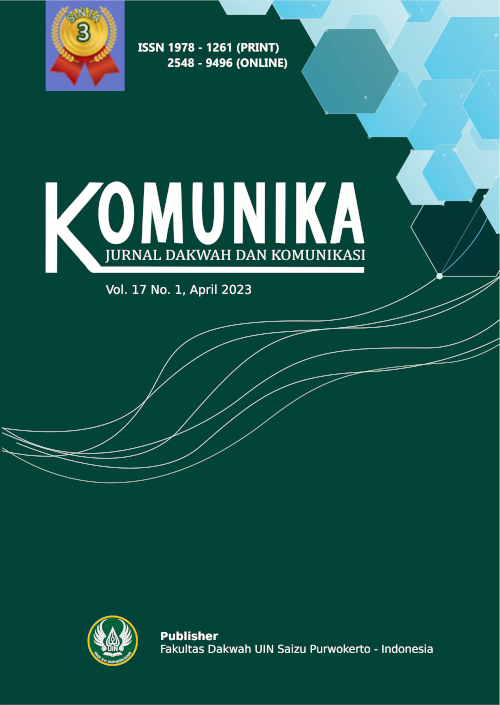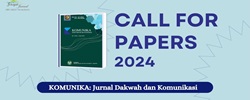Me and My Secrets: A Phenomenological Study of Communication Privacy Management of Atheists in the Indonesian Context Regarding Their Identity
DOI:
https://doi.org/10.24090/komunika.v17i1.7787Keywords:
Atheism, Communication Privacy Management, Dramaturgy, familyAbstract
Being an Atheist is always an unpopular choice in the middle of high religious context society. The stigma and pressure from religious groups forced Atheists in Indonesia to hide their identity in public generally and when taking care of the affairs of state administration. This research utilized Communication Privacy Management and Dramaturgy Theory alongside the phenomenology perspective to reveal how Atheists in Indonesia live their "beliefs" in their not-so-friendly environment. The results showed that they generally presented themselves as religious in front of their family by pretending to practice religious rituals, contributing to their special personal branding for the families. Meanwhile, in other social environments, such as friendship, they could be freer to present themselves as they were, although they still had to manage private information about their Atheist identity.Downloads
References
Abdurahman, A. I., & Saputra, F. T. (2021). Communication strategy of Tasawuf Underground Community in da’wah towards Punk Community. Komunika: Jurnal Dakwah Dan Komunikasi, 15(2), 173–190. https://doi.org/10.24090/komunika.v15i2.4595 DOI: https://doi.org/10.24090/komunika.v15i2.4595
Brown, R. E. (2005). Acting presidential: The dramaturgy of Bush versus Kerry. The American Behavioral Scientist, 49 (1), 78-91. doi: 10.1177/0002764205279397. DOI: https://doi.org/10.1177/0002764205279397
Cliteur, P. (2009). The definition of atheism. Journal of Religion and Society, 11, 1-23. https://dspace.creighton.edu/xmlui/bitstream/handle/10504/64446/2009-4.pdf?sequence=1
Dawkins, R. (2006). The God delusion. Boston, MA: Houghton Mifflin Co.
Dell, J. (2016). Extending Goffman’s dramaturgy to critical discourse analysis: Ed Burkhardt’s performance after the Lac-Mégantic disaster. Canadian Journal of Communication, 41(6), 569-588. DOI: https://doi.org/10.22230/cjc.2016v41n4a3017
Daymon, C., & Holloway, I. (2002). Qualitative research methods in public relations and marketing communication (2nd ed.). New York, NY: Routledge.
Dewantara, A. W. (2017). Diskursus filsafat Pancasila dewasa ini. Yogyakarta, Indonesia: Kanisius. DOI: https://doi.org/10.31227/osf.io/t54au
Dumitriu, D. L. (2014). The social dramaturgy of sport: Towards an integrative Goffmanian model. Revista Romana de Sociologie, 25(5/6), 493-511.
Goffman, E. (1956). The presentation of self in everyday life. Edinburgh, Scotland: University of Edinburgh Social Sciences Research Centre.
Goldberg, E. A., Allen, K. R., Ellawala, T., & Ross, L. E. (2018). Male-partnered bisexual women’s perceptions of disclosing sexual orientation to family across the transition to parenthood: Intensifying heteronormativity or queering family? Journal of Marital and Family Therapy, 44(1), 150–164. doi: 10.1111/jmft.12242. DOI: https://doi.org/10.1111/jmft.12242
Greene, K., & Faulkner, S. L. (2002). Expected versus actual responses to disclosure in relationships of HIV-positive African American adolescent females. Communication Studies, 52(4), 297-317. doi: 10.1080/10510970209388595. DOI: https://doi.org/10.1080/10510970209388595
Kehidupan Ganda Kaum Ateis di Indonesia, (2018, July 11). Deutsche Welle. Accessed from https://www.dw.com/id/kehidupan-ganda-kaum-ateis-di-indonesia/a-44631649
Khedner, M. (2014). Personal branding phenomenon. International Journal of Information, Business and Management, 6(2), 29-40.
Kuswarno, E. (2009). Metodologi penelitian komunikasi fenomenologi: Konsepsi, pedoman dan contoh penelitian. Bandung, Indonesia: Widya Padjajaran
Littlejohn, S. W., & Foss, K. A. (2009). Theories of human communication. Jakarta, Indonesia: Salemba Humanika.
Moustakas, C. (1994). Phenomenological research methods. Thousand Oaks, CA: Sage Publication. DOI: https://doi.org/10.4135/9781412995658
Neuman, W. L. (2014). Social research methods: Qualitative and quantitative approaches (7th ed.). London, UK: Pearson.
Njotorahardjo, F. (2014). Manajemen komunikasi privasi seorang mantan pria simpanan. Jurnal E-komunikasi, 2(3), 1-11.
Petronio, S. (2002). Boundaries of privacy: Dialectics of disclosure. Albany, NY: State University of New York Press.
Petronio, S. (2010). Communication privacy management theory: What do we know about family privacy regulation? Journal of Family Theory & Review, 2, 175-196. doi: 10.1111/j.1756-2589.2010.00052.x DOI: https://doi.org/10.1111/j.1756-2589.2010.00052.x
Pinch, T. (2010). The invisible technologies of Goffman’s sociology from the merry-go-round to the internet. Technology and Culture, 51, 409-424. DOI: https://doi.org/10.1353/tech.0.0456
Putri, D. K., Nirwana, M. D., & Sobari, W. (2010). Analisis manajemen privasi komunikasi korban cyberstalking dalam facebook. Interaktif, 3(2), 1-20. Accessed from https://www.neliti.com/id/publications/243521/analisis-manajemen-privasi-komunikasi-korban-cyberstalking-dalam-facebook
Qadaruddin, M., & Bakri, W. (2022). Postmillenial netizens’ reception of da’wah messages on social media. Komunika: Jurnal Dakwah dan Komunikasi, 16(2), 117–128. https://doi.org/10.24090/komunika.v16i2.6428 DOI: https://doi.org/10.24090/komunika.v16i2.6428
Saputra, R. (2020, Mei 19). ‘Like a robot’: Indonesia’s nonbelievers struggle to blend in during Ramadan. The Jakarta Post. Accessed from https://www.thejakartapost.com/news/2020/05/18/like-a-robot-indonesias-nonbelievers-struggle-to-blend-in-during-ramadan.html
Schäfer, S. (2016). Forming ‘forbidden’ identities online: Atheism in Indonesia. ASEAS-Austrian Journal of South-East Asian Studies, 9(2), 253-268.
Suseno, F. M. (2019). Etika politik: Prinsip moral dasar kenegaraan modern. Jakarta, Indonesia: Gramedia Pustaka Utama.
Taskiran, H. B. (2019). Uses and gratifications approach, social media and personal branding: A study on social media users in Turkey. Communication Today, 10(1), 143-155.
Teherani, A., Martimianakis, T., Stenfors-Hayes, T., Wadhwa, A., & Varpio, L. (2015). Choosing a qualitative research approach. J Grad Med Educ, 7(4), 669-70. doi: 10.4300/JGME-D-15-00414.1. DOI: https://doi.org/10.4300/JGME-D-15-00414.1
Wilbur, D. S. (2018). Have you shot anyone? How combat veterans manage privacy with family and friends. Psychology of Language and Communication, 22(1), 71-89. doi: 10.2478/plc-2018-0004. DOI: https://doi.org/10.2478/plc-2018-0004
Wright, J., & Nichols, R. (2014). The social cost of atheism: How perceived religiosity influences moral appraisal. Journal of Cognition and Culture, 14, 93-115. doi: 10.1163/15685373-12342112. DOI: https://doi.org/10.1163/15685373-12342112
Yang, K. C. C., Pulido, A., & Kang, Y. (2016). Exploring the relationship between privacy concerns and social media use among college students: A communication privacy management perspective. Intercultural Communication Studies, 25(2), 46-62.
Zimmerman, K. J., Smith, J. M., Simonson, K. and Myers, B. W. (2015). Familial relationship outcomes of coming out as an atheist. Secularism and Nonreligion, 4(1), 1-13. doi: 10.5334/snr.aw DOI: https://doi.org/10.5334/snr.aw
Downloads
Published
How to Cite
Issue
Section
License
Copyright (c) 2023 Azzumar Adhitia Santika, Rudi Sukandar

This work is licensed under a Creative Commons Attribution-ShareAlike 4.0 International License.
Authors who publish with this journal agree to the following terms:
- Authors retain copyright and grant the journal right of first publication with the work simultaneously licensed under a Creative Commons Attribution-ShareAlike 4.0 International License that allows others to share the work with an acknowledgement of the work's authorship and initial publication in this journal.
- Authors are able to enter into separate, additional contractual arrangements for the non-exclusive distribution of the journal's published version of the work (e.g., post it to an institutional repository or publish it in a book), with an acknowledgement of its initial publication in this journal.
- Authors are permitted and encouraged to post their work online (e.g., in institutional repositories or on their website) prior to and during the submission process, as it can lead to productive exchanges, as well as earlier and greater citation of published work (See The Effect of Open Access).




























